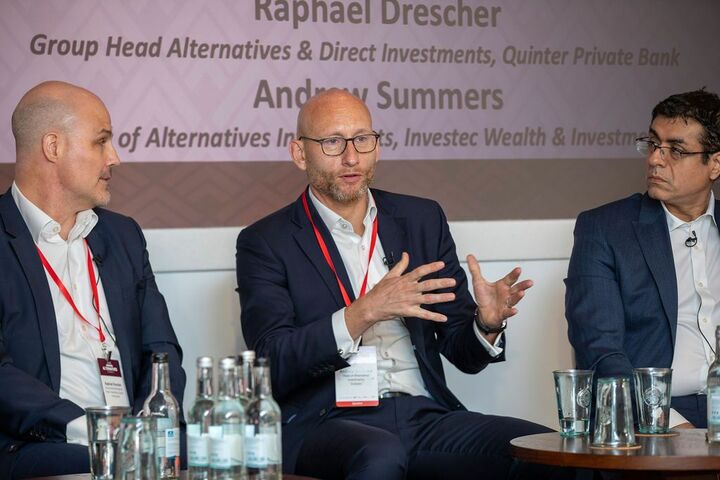Individual investors hold roughly 50% of the estimated $275trn to $295trn of global assets under management. Yet those same investors represent just 16% of AUM held by alternative investment funds, according to Bain & Co.
Andrew Summers, head of alternative investments at Investec Wealth & Investment, said that not investing in the private markets means missing out on diversification benefits, given that 87% of companies in the US with over $100m in revenue are privately owned.
"The private markets world is so much more inefficient and the levers of value-add and the ability to control that value of your asset is so much greater in private markets than public markets," he said.
"The commercial side of it is very important as well. This can be a higher margin business to reflect the additional risk and work for the adviser with stickier assets. So, from first and foremost an investment perspective but also a commercial perspective, I think we should be offering private markets to investors."

The beginning of a long journey
The traditional limited partnership structure of a private markets fund involves long drawdown and investment periods, high minimums and significant illiquidity. As a result, the benefits of the sector have been reserved mainly for ultra-high-net-worth and institutional investors.
"Institutional investors are ahead because they can deal with the illiquidity of that structure, and they have the back-office teams to deal with all the complex administration that comes with it," said Barry Fricke, head of EMEA alternatives distribution for wealth at Goldman Sachs Asset Management.
Moreover, regulatory protections have prevented individual investors from getting access to the space, even if they wanted to.
"Frankly, they would not have wanted to because that structure is not designed in a way that meets the typical requirements and needs of retail investors," he added.
New platform to broaden wealth manager access to private markets
Institutional investors also tend to have more knowledge and greater investment research capabilities than retail investors, as well as much larger ticket sizes that allow them to access the managers with the strongest track records.
"We need to have a situation where that physical paperwork gets reduced, the compliance and regulatory risk around it gets much much better controlled and handled," said Summers.
"The good news is that there are lots of innovations in this space which are doing that, and I think that would be a real game changer."

As fund managers find it harder to raise institutional capital, a range of new product types are being developed to cater to the individual investor, such as evergreen open-ended funds, or semi-liquid structures, as well as European Long-Term Investment Funds (ELTIFs) in Europe and Long-Term Asset Funds (LTAFs) in the UK.
"The LTAF is important for ultimately getting products to the person in the street beyond what is offered currently by investment trusts, but it is a bit of a red herring for now because the democratisation at this initial stage is really getting it from ultra-high net worths just to the high net worths," Summers added.
Retail investors set to drive next wave of alternatives AUM growth
Platforms such as Moonfare, iCapital, PM Alpha and S64 are also working to develop innovative solutions for private banks and wealth managers to access the private markets more efficiently.
Tarun Nagpal, founder of S64, said that although the market still has "a long way to go" in terms of product innovation, it would be healthy for this transition to happen at a steady pace over the next five to ten years.
"I do not think suddenly having an influx of trillions of dollars from retail will necessarily be a great thing if you have not had a commensurate sophistication, and understanding, all the way down to the relationship manager," he said.

Discretionary will be key
According to Nagpal, the critical element of the democratisation of private markets will be to develop innovative product and structure solutions that work for discretionary fund managers and their clients, rather than just for advisory mandates.
"The reason discretionary is the smarter way and is going to be the game changer is because you have to very carefully use that exit liquidity," he said.
"This is not market liquidity, this liquidity is there for personal change of circumstances. It is only 5% a quarter; I do not see the products moving much further than that. So having a professional allocator that can properly manage that liquidity is also very critical.
"Personally, I am incredibly optimistic because we are already working with at least ten banks globally on solving the discretionary piece, so I think that will be the big game changer for the next five to ten years."
Deep Dive: Role of alternatives in portfolios remains despite higher bond yields
Summers noted that it had historically been difficult to use a discretionary mandate to invest in illiquid capital drawdown structures. However, a structure that is open to subscriptions continually and to redemptions periodically "sits much easier in a discretionary mandate".
"If the opportunity set for wealth management in the UK is just advisory mandates, that huge pie of potential AUM shrinks considerably, and, all of a sudden, it becomes harder to create something that can be of benefit to the maximum number of clients," he said.
Raphael Drescher, group head of alternatives and direct investments at Quintet Private Bank, agreed, but noted that unlocking the discretionary space will take time as all stakeholders, particularly CIOs and strategic asset allocation teams, will need to get comfortable.

Risks around 'semi-liquidity'
Semi-liquid private markets funds, popularly known as evergreen vehicles, provide private markets access with a single allocation, monthly or quarterly limited liquidity, investment minimums as low as $10,000 and immediate exposure.
However, in times of volatility or falling equity markets, these funds can suffer heavy redemptions and lead to the managers gating the fund, such as in the widely reported case of Blackstone's $70bn Real Estate Income trust.
According to Summers, the term "semi-liquid" does not properly encapsulate the liquidity profile of these funds, which usually offer up to 5% quarterly liquidity.
"It is almost like it is contingent liquidity, so you will get your money out as long as lots of other people do not want to at the same time," he said. "One has to be very conservative in the way that you market and explain the liquidity or lack thereof to your clients."
Inside Blackstone's multi-million dollar mission to democratise private markets

Instead, Summers said managers should pitch these products as illiquid and highlight the benefits of these structures, such as being fully invested from day one and open to continuing subscriptions.
"A lot of suitability and appropriateness work and education will need to be done to make sure we do not have a problem on our hands in the future," he added.
Goldman Sachs AM's Fricke said that while the opportunity set for asset managers looks appealing, firms will have to think what are the steps they need to take to make sure this process is a collective success.
"The education point is the number one issue, going through relationship managers all the way to the investors, because investor understanding and suitability are absolutely critical," he said.
"The thing we are all taking steps to avoid is any misunderstanding around liquidity of semi-liquid structures. So, it behoves all of us to make sure we, as an industry, take our time to get that right."


